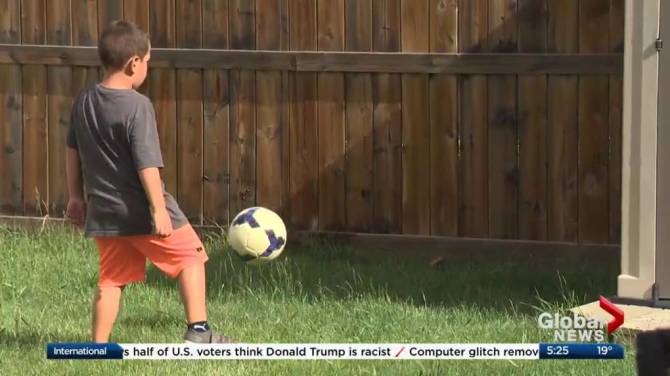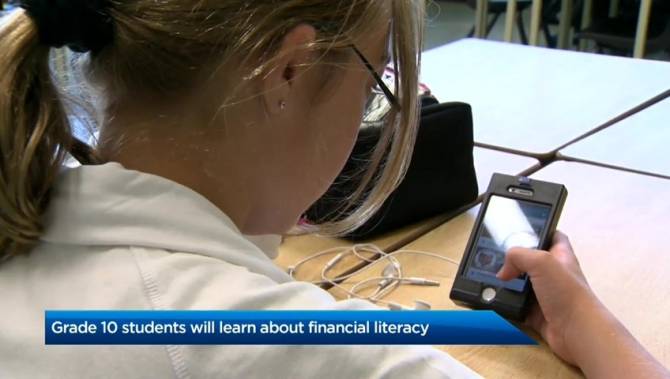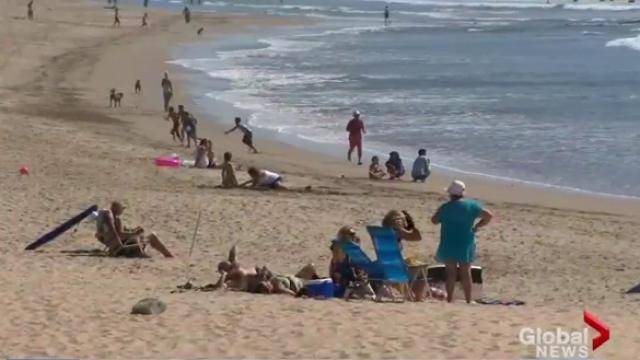When Hannah Miller was 11 years old, her parents sold all of their stuff and took the family abroad.
Their intention was to return after one year, but that didn’t happen. Miller’s family liked travelling so much, they kept doing it.
“We’ve been to every inhabited continent so far,” she told Global News.
During their travels, Miller and her three siblings were “world-schooled.” Her mom, Jennifer Sutherland-Miller, says world-schooling means elevating the principles of homeschooling by creating teachable moments in new, foreign surroundings.
READ MORE: More Canadian parents opting for home-schooling — Fraser Institute
“I’m a big supporter of public education as one way of educating kids, but it’s certainly not the only way,” she said. “We opted to take our kids out of school and do the job differently because we wanted so much more for them than was going to be available.”
‘There are two ways to travel’
Miller didn’t step into a traditional classroom setting until she was 19 years old, when she started an undergraduate degree at Queen’s University in Kingston, Ont. However, she said that in some ways, she felt more prepared for post-secondary education than some of her peers.
“I already had been managing my own schedule. I knew how to self-study so while many of my peers were really struggling to maintain their own classes, I was doing OK,” Miller said.
READ MORE: How to take the environment into account while travelling
“We did do school on the road like you would at a traditional school. We did algebra, we did science, we did English,” she continued.
“Our typical school day would be a few hours of that, and then we’d go out and have adventures… We’d do real-world activities as well as school activities.”
According to Sutherland-Miller, who used to work as a teacher, their travels weren’t random. In fact, each trip — and the activities planned — were very carefully curated with her children’s learning in mind.
WATCH: The benefits of a back to school routine
“We very intentionally crafted our travels, as well as what we did on our travels, around their long-term education,” she said. “For us, this was a strategy towards giving them more tools in life and building their educational and academic lives as well.”
For the Millers, prioritizing education often meant taking the road less travelled.
“There are two ways to travel,” said Sutherland-Miller.
“You can go to Mexico and stay at an all-inclusive resort and hang out on the beach and body-surf and drink all of the free drinks… or you can go to Mexico with a checklist of the things you want your kids to learn.”
READ MORE: Canada’s air passenger bill of rights: What travellers won’t see until December
Sutherland-Miller loved world-schooling because it allowed her kids to “connect with culture in a way that’s more educational than you can ever learn out of book, documentary or TV show.”
While it may seem like a lot of work to world-school your children, Sutherland-Miller said it was no more work than it is to “parent any child intentionally.”
“It took my full-time life for the last 23 years,” she said. “Education was a very holistic and integrative process in our family. Our kids were part of everything, from waking up and cooking breakfast to going to bed at night and everything in between. We learned together.”
WATCH MORE: How to keep kids from getting bored over the summer
Where the effort is needed is in a shift in intention about “the way you want to live your life,” Sutherland-Miller said. “It’s not for everyone, but for us, it’s been a really wonderful way to spend their childhood.”
Family counsellor and parenting expert Alyson Schafer thinks world-schooling is an awesome opportunity, but it comes with some risk.
“You can’t replace the type of education that you’d get out experiencing the world with anything that would happen in the classroom,” she said. “It provides a tremendous foundation for future learning.”
READ MORE: Want to take a family gap year? Here’s how 2 Canadian families are making it work
It’s one thing to read about the Egyptian pyramids, it’s another to see them in real life — and that distinction is what makes world-schooling so special.
However, Schafer said there’s much to consider before pulling your kids out of school and hitting the road.
‘Scaffold learning’ and re-entering formal education
“There’s nowhere in the world that you’re going to travel where you’re going to practice your multiplication table,” Schafer told Global News.
She fears that some parents who don’t have experience in education will forget about progressions that children must be taught before they learn more advanced skills.
WATCH: Grade 10 students in Ontario will learn about financial literacy
“Math [is] a scaffold style of learning. You can’t move onto the next concept until you get the first one,” she said.
Missing the first phases of math, for example, could hurt your child whenever they re-enter a formal education system, Schafer explained.
“I do think people have to be wise about thinking about when they reintegrate their kids into the system. You will have to cover [those areas] in some fashion [so they don’t] take a hit in those subjects when they come back,” she said.
It can be tough to focus on multiplication when you’re steps from the beach in Bali
Homeschooling is difficult as it is — homeschooling abroad is a whole other beast.
“You’ve got a greater pull for other things [your children] want to do,” said Schafer. “You’re in the middle of Bali, and all [your child] wants to do is go to the beach and see the coconuts.”
It’s not common for parents to play a dual role as a teacher in Canada and doing so can have detrimental short- and long-term effects on a parent’s relationship with their child.
READ MORE: ‘Snowplow parenting’ is preventing young adults from learning ‘basic life skills’
“Being both their teacher — criticizing their handwriting and correcting their grammar — [and their parent] can create stress on the relationship if it’s not handled well,” Schafer said. “Not all parents are good homeschoolers.”
For Schafer, what works best will be unique for every single family.
“It’s not one size fits all,” she said.
Your child may need more social integration
Some kids can move seamlessly in and out of different social groups, while others struggle. Schafer encourages parents to consider their child’s social needs before asking them to pick up and move.
“If you’re at a critical friend development year, and your kid isn’t there… most kids can figure it out,” she said. “But if you’ve got a kid who is adamantly opposed, and you’re pushing your own agenda because you have an idea of what a great year would look like for the family,” that’s cause for you to reconsider your decision, Schafer explained.
“You need to consider your motivation.”
WATCH: Travel Tips — Multi-generational family vacations
Schafer also wants to emphasize that world-schooling isn’t always an option due to the cost of travel — and that’s OK.
She’s worried that some parents feel like if they can’t world-school, they’re letting their kids down.
“It’s an affluent thing to do,” she said. “Not world-schooling doesn’t mean you aren’t a good parent.”
© 2019 Global News, a division of Corus Entertainment Inc.



















